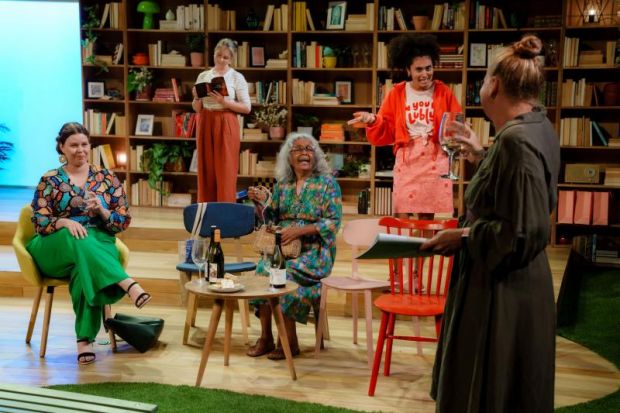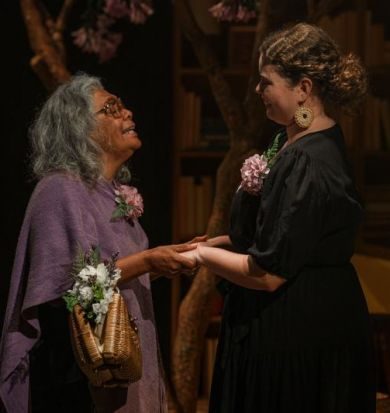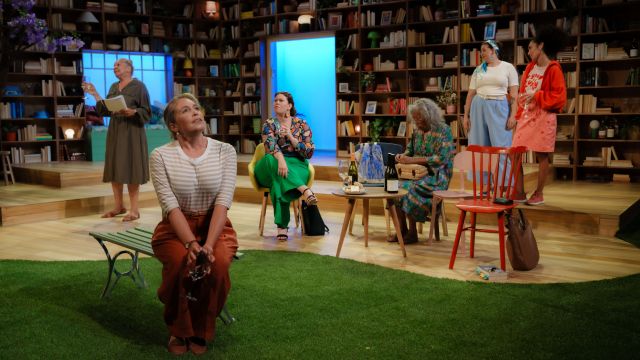Reviewed : 17 January, 2024*

The co-directors of this warm, honest play explain that “Tiddas is a shared Aboriginal word for sisters,” women who have grown together bound by friendship, love, and years of shared experiences. They explain the importance of women in Aboriginal culture as “the backbone and heart of our ways … no matter the changing world around us”.
The five ‘tiddas’ in Anita Heiss’ play – Izzy, Xanthe, Ellen, Nadine and Veronica – have been friends for years. All but Nadine are Aboriginal, but she is married to the brother of one of the ‘Tiddas’. They grew up together in Mudgee but eventually all have moved to Queensland, where they remain close, meeting each month, ostensibly for their book club, in reality just to keep in touch.
As ‘tiddas’ they are open, honest, direct. They know each other well enough to sense changes or disquiet; to question, share, listen and advise. That scenario gives Heiss the opportunity to raise many issues, some personal, some exposing, “truth telling” stories that are of wider importance and impact on cultural identity.

The play follows them over the months of their book club meetings, seeing them through good times and bad, laughter and tears and a major crisis that rocks the solid foundation on which their sisterhood is based. It’s a lot to cover in only 90 minutes, but in carefully developed short scenes that are pithy and concise, Heiss shows the importance of empathy and compassion, understanding and support, resilience and trust.
Co-directors Nadine McDonald-Dowd and Roxanne McDonald make the production move quickly, ensuring clear continuity and clarity as the characters move through complicated situations, exposing rawness, anxiety, bitterness, apprehension, happiness, and grief.
The actors are sure of their characters and their complexities, working as a close ensemble even as they make slight changes to the set, where designer Zoe Rouse has used two walls of high bookcases filled with books, nick-nacks and pot plants to create a spacious room opening onto a grassed terrace and a jacaranda tree that is symbolic to the ‘tiddas’.

It’s a bright, cheerful environment, especially as the colours of the set are reflected in the costumes, designed skilfully to mirror the personalities and occupations of the characters.
Louise Brehmer plays Nadine, the ‘white’ sister who is a respected writer. This is a tough role, as Brehmer takes Nadine from a position of strength through a range of emotional scenes, not the least of which is breach of trust that isolates her from the group.
Lara Croydon is Izzy, striving to be “Australia’s Oprah”, confident, strong, understanding but thrown into indecision when a difficult complication arises. Croydon carries both iterations of the character clearly, one with assurance and poise, the other with honest introspection and perception.
Xanthe, played by Jade Lomas-Ronan, is a peacemaker. Caring and concerned, she is loved by everyone, especially her Grandma and her husband. Lomas-Ronan finds the warmth and fun in Xanthe – as well as the hidden disappointment that she eventually shares with her friends.
Anna McMahon is Veronica, in the throes of a failing marriage and gradually losing what tenuous confidence she has. McMahon takes her through her bitter lows in hesitant explanations, then, with support form the ‘Tiddas’, confidently showing new strength and self-belief.
Ellen, played by Perry Mooney, is fiercely independent, the ‘clown’ of the group who keeps everyone entertained with her ‘bleak jokes’ (she is an undertaker!) and clever one-liners. Mooney carries this role skilfully, making Ellen cheeky and sassy, full of life, caring … but also brutally honest

Co-director Roxanne McDonald plays Xanthe’s grandmother and Izzy’s mother. As the token ‘elder’ in the production, she is a constant to all the friends, part of their meetings, supporting when asked with wise advice. McDonald is clever performer, she is in every moment, watching, listening, reacting quietly, or with a telling change of expression or perceptive aside.
Sean Dow plays the five men in their lives! With a change of walk, voice, personality and costume he becomes husband, brother, lover, equally believable in whatever role.
Tiddas is about a sisterhood, but it’s message reaches beyond the ‘tiddas’ to raise “serious questions” about “the truths, half-truths and outright lies we tell ourselves” (Eamon Flack Artistic Director, Belvoir Street Theatre).
First published in Stage Whispers magazine
*Opening production